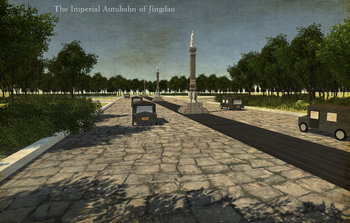Teikoku michi: Difference between revisions
m (Jonas windsor moved page Imperial Autobahn to Teikoku michi) |
mNo edit summary |
||
| Line 1: | Line 1: | ||
[[File:Imperial Autobahn.png|thumb|350px]] | [[File:Imperial Autobahn.png|thumb|350px]] | ||
[[File:Map imperialautobahn.png|thumb|350px|Map of the Imperial Autobahn in the year 1679.]] | |||
The '''Imperial Autobahn''', '''Teikoku michi''', or '''Imperial Road''', is the spiritual successor of the '''Ducal Road'''s in Kildare. These controlled-access highways connect large cities in the [[Jingdaoese Empire]] with each other. The highways are property of the Empire and no State can - without approval of the Grand Secretariat collect tolls. | The '''Imperial Autobahn''', '''Teikoku michi''', or '''Imperial Road''', is the spiritual successor of the '''Ducal Road'''s in Kildare. These controlled-access highways connect large cities in the [[Jingdaoese Empire]] with each other. The highways are property of the Empire and no State can - without approval of the Grand Secretariat collect tolls. | ||
Revision as of 19:25, 16 December 2019
The Imperial Autobahn, Teikoku michi, or Imperial Road, is the spiritual successor of the Ducal Roads in Kildare. These controlled-access highways connect large cities in the Jingdaoese Empire with each other. The highways are property of the Empire and no State can - without approval of the Grand Secretariat collect tolls.
Unique to the highway system is the attempt that was made to let it blend with the surrounding nature. In the early days the highways were seen as a propaganda tool: the fastest way were not necessarily taken. The roads bent with the landscape, to maximize an enjoyable trip through the realm. Statues of Sisera were often found across it. During the reign of the Chidao Emperor the focus was shifted towards the economic needs of the empire. Many of the historic roads were replaced with concrete. New roads would often follow a more efficient path, in those cases the old routes have been kept as Historic Autobahn and are off-limits to heavy vehicles.
There are currently
IA 1: Sheng - Tailu - Huangqi - Guan - Nimeng - Changlong - Toubao - Gaelen's Landing - Xiao - Guntou - Chengyanxiang - Hongwei - Yanting - Dasha - Daocheng - Mengjing - Haiching - Yingmeng - Yingzhou - Yizhou - Yangzhong - Langqi - Mawei - Guxi - Gudong - Dongsheng - Jinhan - Gangdiguo - Aleshuizamen - Nonjin - Xiacheng - Wonsong - Fosavlos
IA 2: Yuanbeicheng - Lifang - Zhailifeng - Wutun - Shangmei - Xingtian - Shaikou - Tongtai - Lukaolei - Zhangdun - Jiangkou - Hongsejiamen - Masha - Yunpei - Wacunzhen - Agnigrad - Zhishan - Maipei - Miaochan - Yanghou - Daheng - Xiayang - Qiaoxi - Muxiecheng - Bandong - Chiyuan - Houhangye - Yanping - Xiaruo - Nantong - Shazhigang - Nanyu - Haimiku - Jiangnan - Guntou
IA 3: Gangdiguo - Xiadu - Shuibu - Wenquan - Xuanya - Wangzhuang - Wufeng - Yuefeng - Huanxi - Jijiang - Rixi - Xitan - Weicheng - Xibing - Xiabaishi - Meiyanwu
IA 4: Gangdiguo - Alashuizamen - Matsugata - Kaimincheng - Nayeong - Wangzhuang
Restrictions
The Imperial Autobahn is open to vehicles:
- Are capable of driving at least 80 km/h
- Have a maximum length of 12m (single motorcar or trailer)
- Have a maximum length of 30m (combination of motorcar and trailers)
- Have a maximum width of 2m60
- Have a maximum height of 4m20
- Weigh no more than 40 metric tonnes (single motorcar or trailer)
- Weigh no more than 80 metric tonnes (combination of motorcar and trailers)
Some of the roads adhere to the Maoxiang Standard, specially licensed vehicles on these roads:
- Have a maximum width of 4m
- Have a maximum length of 16m (single motorcar or trailer)
- Have a maximum length of 64m (combination of motorcar and trailers)
- Weigh no more than 60 metric tonnes (single motorcar or trailer)
- Weigh no more than 200 metric tonnes (combination of motorcar and trailers)

